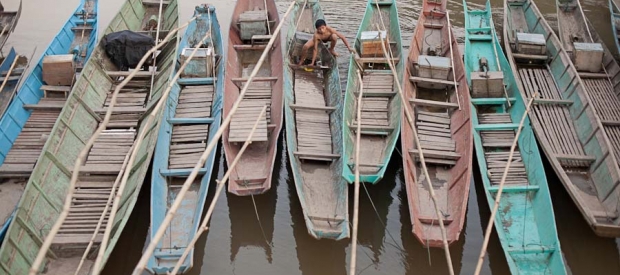AusAid Review of MRC’s Procedure for Notification, Prior Consultation and Agreement
New research by DFAT (Department of Foreign Affairs and Trade) addresses the critical shortcomings of the Mekong River Commission’s (MRC) Prior Consultation process, echoing some of the concerns raised by civil society about its first trial run on the Xayaburi Dam and demonstrating the need for urgent reform before other Mekong mainstream dams undergo this process.
In 2012, the Australian Aid program (AusAid) commissioned a review of the MRC's Procedures for Notification, Prior Consultation and Agreement (PNPCA) process. They hired an international consultancy firm to conduct interviews with representatives from the non-government and government sectors in Thailand, Vietnam and Cambodia who had been observers or participants in the consultation process for the Xaybauri Dam - the first project to undergo the PNPCA process in 2010. The review was expected to be completed by the end of 2013. However the consultants responsible for the review reportedly pulled out of the project and the study was never officially completed.Cambodia, Thailand and Vietnam did submit draft reports from their consultations and in February 2014, International Rivers wrote to the Australian Ministry of Foreign Affairs to request that these reports be shared with participants of the review in each country.
In response, a summary of the findings from the country reports was shared with International Rivers in a letter addressed to Thailand Campaign Coordinator, Pianporn Deetes, who was involved in the consultation in Thailand.
- Read International River’s letter to the Australian Ministry of Foreign Affairs
- Read response from the Australian Ministry of Foreign Affairs, with the summary of the review
As one of the primary funders of the MRC's Mekong Integrated Water Resources Management program, which includes support for the implementation of the PNPC process, the Australian Government has a responsibility to ensure that the process is working in a way that allows meaningful consultation and facilitates regional decision-making. Therefore International Rivers urges the Australian Government along with other international donors of the MRC, to demand that the issues raised in the PNPCA Review be addressed and that the Prior Consultation process be reformed to respond to these concerns, before any further decisions are made regarding dams on the Mekong mainstream.
The main areas of concern raised in the Summary of 2012 PNPCA Research include:
- Sequence and timeliness of consultation process:The formal PNPCA articles note that Prior Consultation requires “timely” notification, but what constitutes timely is not further specified. However the Prior Consultation process is intended to discuss and evaluate the impacts of the "proposed use" of a project. Therefore, interviewees taking part in the review noted that Prior Consultation should be held before any key contracts, such as the Power Purchase Agreement are signed, before construction can begin and before there is irreversible commitment for a project to proceed. In the case of the Xayaburi Dam, Laos and developer Ch. Karnchang began implementing the project in late 2010, before the Prior Consultation process was initiated or concluded.
- Quality of information: While the PNPCA articles specify that “notification of a proposed use must include the feasibility study report, implementation plan, schedule and all available data”, the PNPCA Guidelines are more ambiguous, stating that a “summary of the study and only relevant portions are acceptable as being sufficient and practical.” The review notes that during consultation for the Xayaburi Dam, participants were given minimal information, which was insufficient to evaluate the project's impacts. CSO/NGOs in Thailand and Cambodia reported that only summary documents in the form of power point presentations were available at national consultations, while the expectation of participants was for the full disclosure of the EIA report. The full EIA for Xayaburi was not made public until March 2011, after the consultations had already taken place. Participants in the review noted that methods for sharing and questioning information need significant improvement, including: the translation of documents into local language; the release of relevant information well in advance of the consultation, and more focus on transboundary impacts.
- Quality of consultation: The consultations were led by members of the MRC Secretariat, and project developers were not on-hand to answer questions at national consultations. As a result the consultations were viewed more as a forum for giving out information, without adequate explanation and discussion of the project's impacts. Frustration over such inadequate representation was felt by participants, along with those tasked with conducting the consultations.
- Duration of consultation: The default time-frame for consultation is six months. According to AusAid's review interviewees were unanimous in their view that a six month time frame was insufficient for meaningful consultation, particularly if materials were not shared in advance. The current PNPCA articles allow for extension of the Prior Consultation if required or requested. However the official decisions about the extension or completion of Prior Consultation in the case of the Xayaburi Dam were unclear, creating a dissonance that the MRC has not been able to solve and that remains today.



